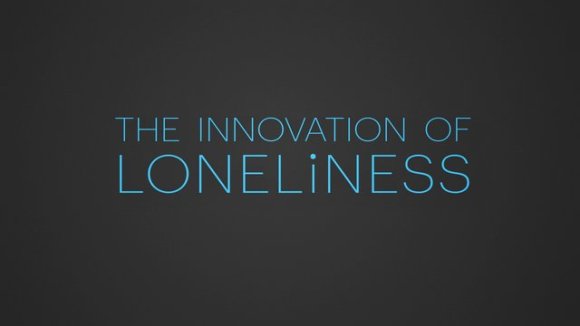“Our social lives become tainted and more demanding than ever before.”
Does social media really aid in how lonely we feel? A month or so ago, I shared a post about social media being directly related to the amount of anxiety a person feels; this is commonly referred to as the FOMO, the fear of missing out. Here is The Innovation of Loneliness video. I really love how this video is able to elaborate and expand this idea. The video says, we are sacrificing conversation with a mere connection.
Instead of engaging and really getting to know people, we are in turn getting to know their photos and statuses, rather than the person themselves: “I share, therefore I am.” We see who they want us to see. Only an edited version of themselves. With all of this, there has become a loss of complete interaction with others. Sometimes a screen won’t cut it and in turn we feel lonely. What are your thoughts on this topic? Do you agree with the points in this video?


Reblogged this on JGrozny's Blog.
Hi. Thanks for checking out my blog. One of my favorite things about people doing that is being introduced to their blogs. I agree with what you say, especially about only being shown what they want to show. There’s a woman I know from Facebook who I’ve been connected to for several years, but don’t know what she looks like. We share recipes and knitting patterns, but I’ve never seen her. Kind of crazy when you think about it. Call me old fashioned, but I miss getting letters in the mail from friends and family who didn’t live close any more. A poke on Facebook just doesn’t get it.
Thanks again,
LynnetteOK
Oh I completely agree! Letters and pen pals are very underrated. I actually used to be part of the YouTube vlogging community years ago, and had friends from across the world that I had never even met in person. The majority of my friendships were behind a screen. It’s interesting, but sometimes you miss the human connection and the face-to-face of it all.
I remember as a kid when VCRs first hit the mass market. The thinking was movie houses would soon meet their doom. I knew back then as I know now – perhaps I’m a bit sappy – but people need people, they need social interaction in ‘real time’ with ‘real people.’ People still go out and socialize.
I like the blogs when people show their image and use their real name – it gives me a better sense of who they are. We all know a certain amount of editing goes on behind the scenes – much the same as a wonderful book is edited in manuscript before it is published or a scene is reshot before reaching final movie stage or we change outfits because we think we could look better. I think most people who blog do it as an addition, to their conversational outlets, not in spite of – though, there are definitely folks who utilize the electronic chatting as a way to be social (because their fears keep them from otherwise doing so).
When I chat or comment, I do try imagining the person on the other side. I think technology on the whole gives us a sense of wonderment as is does isolation as it does fear of becoming immersed in an impersonal society. In the end, I like to believe in mankind’s ability to care and need the contact of others. And that doesn’t happen with a keypad/mouse…and I always have to remind myself that human beings – not machines – created computers…
AnnMarie 🙂
Wonderful, introspective and thought provoking post – thank you
Granted, this report is a bit old, but I think it still bears mentioning: in 1998, there was an article in the journal American Psychologist, “Internet Paradox: A Social Technology that Reduces Social Involvement and Psychological Well-being?” that recounted the findings of a longitudinal study conducted by researchers at Carnegie Mellon. This summary is from Richard DeGrandpre in his book Digitopia:
“As the study’s 169 participants went online for one to two years, the researchers measured changes in their communication with family members, the size of the participants’ social circles, and their levels of depression and loneliness. What they found was that each and every measure showed an overall negative trajectory for these users. Specifically, the data showed that more time spent online meant less communication with immediate family members, a shrinking of one’s social circle, and increases in self-reports of both loneliness and depression (these results have also been replicated in a less rigorous study, which showed similar effects for individuals who spent more than five hours a week online).”